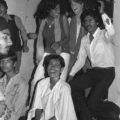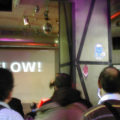Tom Robbins has long been one of my favorite authors; every one of his seven novels is a gem, infused with his uniquely loopy sensibility and style. This novel (Amazon UK | US), published in May, 2000, was eerily timely in its discussion of West vs. East and Muslim vs. Christian, in the context of a story about a renegade CIA agent, an Amazonian curse, the third prophecy of Fatima, and a band of excommunicated nuns in the Syrian desert. Among many other things, Robbins glances at a topic which has long puzzled me:
“…the sexual insecurities that among men of the Middle East achieved titanic, even earth-changing proportions; insecurities that had spawned veils, shaven heads, clitoridectomies, house arrest, segregation, macho posturing, and three major religions.”
Many of the world’s cultures and religions focus to an amazing degree on controlling women, and especially women’s sexuality. (As Robbins points out, it’s a global phenomenon: “The Levant had no monopoly on penile insecurity.”) It is true that much of this nastiness is enforced by women themselves upon their daughters unto the nth generation, but it’s all intended to “benefit” the men.
For example, the “logic” behind clitoridectomy is that, if a woman can’t enjoy sex, she won’t go looking for it outside of marriage. Less brutal methods for ensuring fidelity include covering her up so no one sees her, and and locking her up so she never gets the chance. In many cultures, the punishments for a woman’s infidelity (or even imagined infidelity) are far more severe than for men: death by stoning, murder by the husband and his family, or societally-condoned mutilation.
I guess these men are all afraid that they just aren’t man enough to keep their women satisfied.
Italy has a reputation (in America, at least) as having a “macho” culture, but this doesn’t work the way macho does in other places. Most Italian men would rather prove their virility by seduction than by force. Every now and then some silly pollster does a Europe-wide or worldwide survey on “who’s the best at…” Italians are generally rated the best lovers, a result widely reported in the Italian press. ; )
I’ve met a young Irish woman working in Milan as an au pair. Recently she and three friends were out drinking at a bar. One was mildly propositioned by a man, whom she turned down. Later, apparently, something was slipped into their drinks. The woman who had been propositioned has confused memories of winding up somewhere with the guy, with her pants off, but when she said “No,” he desisted. She and another of the women then slept all weekend, leading them to believe they had been drugged. When they confronted the man a few days later, he looked guilty, but pointed out that they couldn’t prove anything.
I’d never heard of this “date rape drug,” though it’s apparently well known elsewhere, and a fairly common danger in some parts of the world. The Irish woman told me that, home in Ireland, she would never touch a drink in a pub or disco unless she’s seen it poured and picked it up from the bar herself.
I told the story to some Italian women, and they agreed that this is a highly unusual event in Italy. The reason they gave was an insight into the culture: “No Italian man would want to go to bed with a woman unless he’d earned her.”












